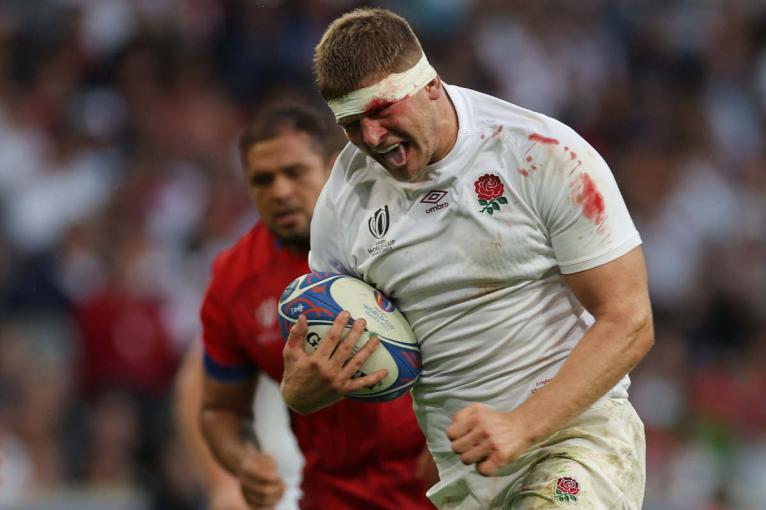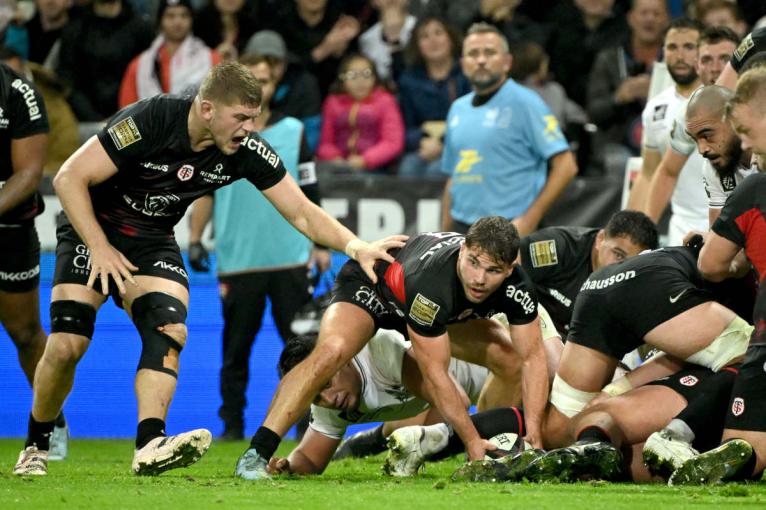If England are to beat the All Blacks on Saturday, they will have to do so without arguably their most in-form player.
Jack Willis has been at the top of his game this season for Toulouse, putting in one superlative performance after another. “Today was a Jack Willis masterclass,” admitted Sébastien Piqueronies, the manager of Pau, after the English flanker had helped his side to a 22-14 victory last week. Toulouse’s defensive coach, Laurent Thuéry, said Willis had “set the tone” for the win. “What I liked tonight,” added Thuéry, “was that he was dominant in the tackle.”
Dominant in the tackle, prominent with his ball-carrying and, perhaps most significantly, a menace at the breakdown where Willis won several turnovers. “At every ruck you see him,” said Toulouse winger Matthis Lebel. “When he pulls out a performance like that, he really brings a lot to the team.”

Just how vital Willis is to the European champions was apparent at the start of this month when he missed a couple of matches with a thigh injury: Toulouse lost at home to Bordeaux – their first defeat at home for two-and-a-half years – and away at Castres.
Willis appeared at the pre-match press conference before the trip to Pau, answering questions in fluent French, a skill he has quickly mastered, unlike many Anglophone players who struggle to string together a sentence in French even after two or three seasons of Top 14 rugby.
One of the questions put to Willis concerned his future. Has he decided where he will play his rugby in the coming seasons? He laughed and confirmed that he’s taken a decision, but he wasn’t at this stage in a position to elaborate.
Assuming his form continues into next year, Willis will be selected for the British and Irish Lions tour to Australia, and there is a good chance he will make the Test squad.
The media have done it for him, however, with the revelation that he’s signed an extension that will keep him at Toulouse until June 2029. Willis will be in his 33rd year by then, the age when most loose forwards are thinking of calling time on their careers.
In other words, barring a change of heart from the RFU on their rule excluding overseas players from international selection, Willis’ 14th and final cap was his appearance against Chile in the 2023 Rugby World Cup.
Assuming his form continues into next year, Willis will be selected for the British and Irish Lions tour to Australia, and there is a good chance he will make the Test squad. Capable of playing across the back row, Willis also has the winner’s temperament, having won two Top 14 titles and a Champions Cup title in the two years he has been at Toulouse. In each of those three finals, Willis was outstanding. Big occasions overwhelm some players but not Willis, who thrives on the pressure.

Lawrence Dallaglio and Clive Woodward are among those this year who have criticised the RFU’s stance on not selecting players based abroad. In an article this month in the Daily Mail, Woodward wrote: “Every England coach needs to work in a no-excuse environment. Having their hands tied behind their back over non-selection of overseas players is plain crazy.”
The England World Cup-winning coach name-checked four players who in his view would add “depth and value to the vision of England” – Owen Farrell, Jack Willis, Henry Arundell and Kyle Sinckler.
There is a crucial distinction, however, between Sinckler and Farrell, and Willis and Arundell. The former pair are in their 30s, and at the end of long and illustrious international careers; furthermore, they joined Toulon and Racing respectively primarily for financial gain. They could have extended their time at Saracens (Farrell) and Bristol (Sinckler) but decided on a new challenge. As Sinckler explained recently: “Sometimes it’s hard to keep the flame alive when you’re doing the same thing every day. It becomes more of a job than a passion. So I felt that coming to Toulon would rekindle my passion.”
Playing in the Top 14 each week where every game is massive and you have to win, that’s where you learn. You learn to fail, and you learn to get better.
Neither Willis nor Arundell had the luxury of weighing up their options over the course of several months. Arundell, who turns 22 next week, joined the London Irish academy when he was 14 and made his first-team debut in November 2021. At the end of the 2022 season, he signed what London Irish described as a new ‘long-term’ contract. It turned out to be short-term. London Irish went into administration at the end of the following season and the players had to take what offers came along.
For Arundell, that was a one-year deal tabled by Racing 92, which was then extended by a further two years. “Playing in the big games, playing in the Top 14 each week where every game is massive and you have to win, that’s where you learn,” said Arundell at the start of this year. “You learn to fail, and you learn to get better.”
Willis was a victim of Wasps’ financial meltdown in November 2022, an experience that affected him deeply. “It was devastating what happened at Wasps,” he said in 2023. “I don’t think I’ll ever get over that. That will be a scar I hold forever.”
When I spoke to Willis last year for Rugby Pass, he said he would have liked to have spent all his career at Wasps, but it wasn’t to be. One day he was a member of one of England’s most famous rugby clubs and the next he was jobless. Willis was luckier than some; within a month he had signed a six-month deal with Toulouse. That was extended a further three years in 2023 and now he has committed himself to the club until 2029.

“Toulouse have reaffirmed my faith in rugby,” Willis told Rugby Pass last year. ‘What I love about Toulouse is the way they look after the lads post-rugby. You’ll find ex-players working in the office or with the coaches. That’s the sign of a proper club that looks out for you.”
Willis evidently feels a debt of gratitude to Toulouse, just as Arundell does towards Racing. That’s why they are prepared to sacrifice their international careers, out of loyalty to clubs that were good to them at a time of crisis in their lives.
The RFU should recognise this distinction between players like Willis and Arundell, who were placed in an awkward predicament by the mismanagement of their clubs, and players such as Farrell, Sinckler, Lewis Ludlum and Billy Vunipola.
Unlike Willis, Blair Kinghorn will be playing for his country next month because Scotland picks its best players, regardless of where they live.
Woodward is right; the intransigence of the RFU on the issue of French-based players is “plain crazy”. Willis’ game has improved so much since he joined Toulouse because he is playing with some of the best in the business: Antoine Dupont, Romain Ntamack, Julien Marchand and Francois Cros.
The same applies to Blair Kinghorn, the versatile Scotland three-quarter, who arrived in Toulouse after last year’s World Cup and six months later won the Champions Cup. “People always want to play the best rugby they can,” he said after seeing off Leinster in the final. “My experience here is really top notch.”
Unlike Willis, Kinghorn will be playing for his country in next month’s internationals because Scotland picks its best players, regardless of where they live.


Jack Willis was made Toulouse captain for the first time against Bayonne, both an honour and a sign that he has made up his mind.
In fairness it wasn't just the money in Farrell's case. The anti-Farrell hate campaign was taking it's toll mentally.
It's not about any one player. The rule about not selecting overseas players is there as part of the agreement the RFU have negotiated with the PRL.
The RFU wants the PRL to develop EQPs and it wants access to those players for training and (for those on hybrid contracts) a say in how their fitness and playing time is managed. The RFU does not have an agreement like that with the FFR, LNR or Top 14. The PRL wants to keep the players it has developed, and not have to compete with French clubs on their wages.
If the RFU makes an exception for a player - however good that player is - it undermines the whole approach. In the history of the agreement, they've been willing to make exceptions on two occasions: in the aftermath of the Wasps/Worcs/LI collapse, they offered to make an exception for Arundell (and possibly some others) as long as they committed to return to England at the end of their contracts. They didn't. The other exception was Jonny Wilkinson, who had written into his Toulon contract that he could leave them to attend England training.
Players make their choice to go to France, and that's fine. But they know when they leave that they are cutting themselves off from international rugby, and that's their choice. It's different for Scotland, because Scotland only has two top tier clubs and some of its players need to play elsewhere to get game time. But Ireland, Wales and NZ all have approaches to keep their top players playing domestically. And France effectively does just by paying more than everyone else.
Clive Woodward needs to shut up